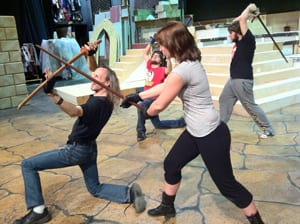
The West Liberty University Hilltop Players will present William Shakespeare’s tragedy “Macbeth” or – as it is referred to by the theater community – “The Scottish Play,” beginning Feb. 23.
“Macbeth” is the story of a respected soldier who meets three witches in the woods. The witches make a life changing prophecy for Macbeth and he must decide whether he has the nerve to make the prediction come true.
The play focuses on a man’s inner struggle with his conscience and is a source of much superstition among theater people. The name “Macbeth” is forbidden around rehearsal because it is said to bring actors terrible luck. This superstition dates back to the 1600s and revolves around the iconic characters of the three witches. It is said that Shakespeare used actual spells while writing the witch dialogue. It spooked the audiences and aroused their superstitions. The Hilltop Players are honoring the old theater tradition during rehearsals by referring to the work only as the “Scottish Play.”
Preparations for “Macbeth” began before final exams took place last semester with auditions. Rehearsals began the first day of classes this year.
Director John Hennen said, “It was a departmental decision to take on ‘Macbeth.’ Classics like Shakespeare’s works are difficult to do, but the students should get a chance to be in a classical production. Shakespeare is a major part of theater and it gives the students a different perspective of a play.”
Performing a Shakespearean play does not come without its share of difficulties. The most difficult part is the language and understanding what the characters actually mean when they speak. Hennen made a few minor script changes by replacing archaic Shakespearean phrases with more modern words to help the audience better understand. There is also the challenge of picking up the rhythm of the language.
Hennen said, “Shakespeare requires a different style of acting which is bigger and broader than a realistic play. The cast is working hard to pick up larger than life roles. You do not do a major play like ‘Macbeth’ without the talent to do it.”
The cast consists of about 15 people and is comprised mostly of theater majors. Junior theater major Derek Park has the privilege of undertaking the challenging role of Macbeth. Park described his experience in “The Scottish Play” as a whirlwind.
He said, “These last six weeks of rehearsals have flown by, and I cannot believe we are already getting ready to open the show. I have been blessed with several terrific parts while on the hilltop, but this is the role of a lifetime. I know that this will be an experience that I will always cherish, as it doesn’t come around very often.”
Hennen predicts that the audience will enjoy a number of things about WLU’s rendition of “Macbeth, ” including exciting combat fighting portrayals in the opening scene and in the final battle between Macbeth and Macduff. Shaun Rolly, a certified stage combat choreographer from Pittsburgh, choreographed all of the combat sequences in the play.
The sword fighters are under the direction of freshman Meaghan Macy, the designated fight captain. Macy leads the other sword fighters in practicing their combat sequences. They must be extremely careful, as they are using real swords.
The play will open at 7:30 p.m. on Feb. 23 in the Kelly Theatre on the WLU campus. It also will be performed at 7:30 p.m. on Feb. 24 and March 1, 2 and 3; and at 3 p.m. on March 4.